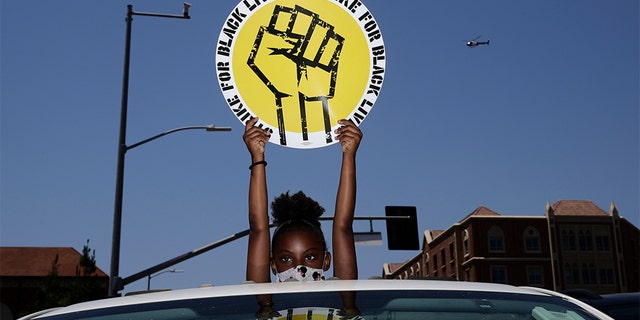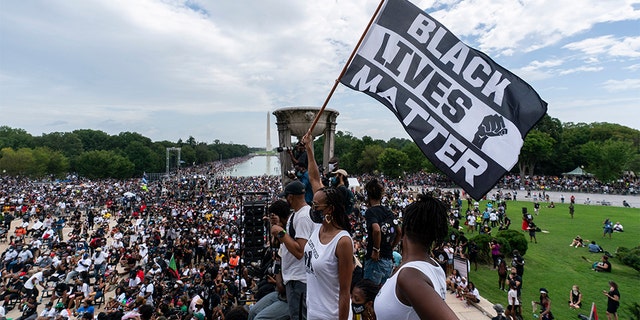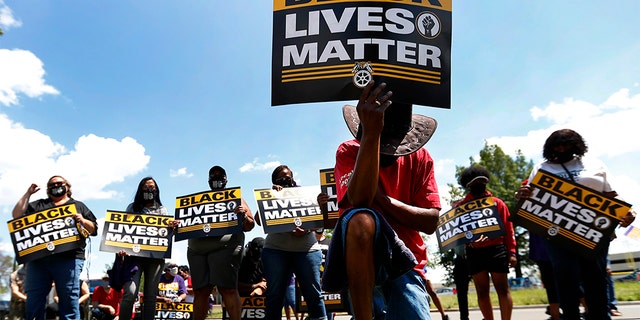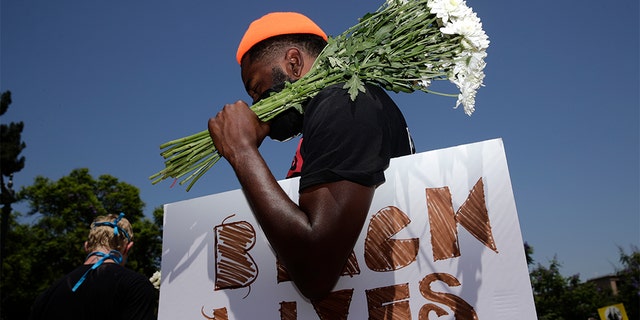Unions representing millions of workers, from teachers to truck drivers, pledged to ramp up protests in the leadup to the presidential election, with walkouts aimed at forcing local and federal lawmakers to pass police reform and address what they described as systemic racism.
In a statement first shared with The Associated Press on Saturday, labor leaders from America's biggest public and private sector unions said they would organize walkouts for teachers, autoworkers, truck drivers, and clerical staff, among others.

FILE - In this July 20, 2020, file photo, Audrey Reed, 8, holds up a sing through the sunroof of a car during a rally in Los Angeles. Ahead of Labor Day, major U.S. labor unions say they are considering work stoppages in support of the Black Lives Matter movement. (AP Photo/Jae C. Hong, File)
“The status quo — of police killing Black people, of armed white nationalists killing demonstrators, of millions sick and increasingly desperate — is clearly unjust, and it cannot continue,” says the statement from several branches of the American Federation of State, County, and Municipal Employees, the Service Employees International Union, and affiliates of the National Education Association.
AFSCME, SEIU, and NEA include liberal membership that typically votes Democrat by margins as high as 80%.

FILE - In this Aug. 28, 2020, file photo, a woman holds a "Black Lives Matter," flag during the March on Washington at the Lincoln Memorial in Washington, on the 57th anniversary of the Rev. Martin Luther King Jr.'s "I Have A Dream" speech. Ahead of Labor Day, major U.S. labor unions say they are considering work stoppages in support of the Black Lives Matter movement. (AP Photo/Alex Brandon, File)

The latest development comes after a summer of protest nationwide from youths to athletes. Some of the protests have turned violent, with rioting and looting in several cities.
“They remind us that when we strike to withhold our labor, we have the power to bring an unjust status quo to a grinding halt,” the union leaders said in the statement.
“We echo the call to the local and federal government to divest from the police, to redistribute the stolen wealth of the billionaire class, and to invest in what our people need to live in peace, dignity, and abundance: universal health care and housing, public jobs programs and cash assistance, and safe working conditions,” the statement reads.

FILE - In this July 20, 2020, file photo, Eddie Perkins takes a knee during a protest rally outside Hartford Nursing & Rehabilitation Center in Detroit. Ahead of Labor Day, major U.S. labor unions say they are considering work stoppages in support of the Black Lives Matter movement. (AP Photo/Paul Sancya, File)
The Nonprofit Professional Employees Union, which represents several hundred workers at more than 25 civil rights groups and think tank organizations, told the AP it signed onto the union statement because “the fights for workers’ rights, civil rights, and racial justice are inextricably linked.”
The calls for justice include more police accountability; acts that would ban police use of chokehold maneuvers and end qualified immunity for police officers, among other reforms; and the reallocation of police money to address mental health, homelessness, and education services in communities.

FILE - In this July 20, 2020, file photo, holding flowers and a sign, Blair Toles, 30, attends rally in Los Angeles, on Black Strike Day. Ahead of Labor Day, major U.S. labor unions say they are considering work stoppages in support of the Black Lives Matter movement. (AP Photo/Jae C. Hong, File)
Meanwhile, police unions have rallied behind President Trump, with the Fraternal Order of Police and New York's influential Police Benevolent Association among numerous state and local unions endorsing the incumbent.
Companies are faced with a “Which side are you on?” moment due to growing support for the BLM movement, said Maurice Mitchell, national director of the Working Families Party and a leading organizer in the Movement for Black Lives, a national coalition of 150 Black-led organizations.
“If I was a decision-maker that was considering whether or not to meet the demands of the unions, I would be scared,” Mitchell said. “This movement is spreading. We’ve been on the streets consistently, we’re building on the electoral front, and now we’re seeing this conversation at the highest levels of labor.”
The Labor Day holiday dates to the early 20th century and envisioned as a public celebration of “the strength and esprit de corps of the trade and labor organizations” of the community.
This year’s commemoration may seem strained with social distancing and much uncertainty about the future of jobs and opportunity, but the situation is less dire than feared at the start of the COVID-19 crisis. Americans are resilient and are finding ways to cope. We should all take pride in that. It’s also possible the disruption will have some positive side effects, like shaking up the status quo regarding labor unions.
It is unlikely work-life will revert to the way it was before the COVID-19 crisis. Many workers have learned to clock-in from home — and found they prefer it. Big companies are rethinking large offices now that they know workers can do things remotely. Service-oriented businesses like restaurants have switched over to delivery as the primary means of reaching customers. City populations will thin if offices go empty, and the ancillary businesses that relied on the white-collar workers — like dry cleaners, delis, and parking lots — will thin out as well.
Parents who hadn’t considered homeschooling have been forced to try it or other alternate education models. Some parents will prefer alternatives, meaning smaller classes and fewer teachers at traditional schools. Doctors learned how to practice telemedicine, when possible, limiting their need for offices and support staff. And so on, across the economy.
That’s “creative destruction,” and it’s necessary if sometimes painful sort of change. We must cope and adjust. Instead of being clustered together in a workplace, more of us will be independent actors, providing valuable services from home. One of the great banes of workers — commuting — will decline as a concern. Fewer people will need to leave their homes and those who must find streets less crowded. Parents who once saw their children for only a few hours a day will now be more often present.
What will all this change mean for labor unions, a prominent workforce influencer for more than a century? The shift away from a traditional workplace eliminates one of the main ways organizing was accomplished: employees talking to one another.
Workers will be less inclined to see themselves as members of a collective if they don’t actually see colleagues on a daily basis. Individual workers will feel more empowered to make demands of their employers since they can more easily switch to another job. In schools, even a modest decline in class size will likely have a huge effect on teachers' unions, since this will cut down the number of teachers. Union leaders were already struggling to maintain their numbers in the pre-COVID-19 workplace.
The growth in the so-called gig economy, now accelerated, will be a particular problem for unions. Gig workers are typically hired as contractors and, therefore, not legally organizable by unions. That’s why unions have been fighting a rearguard effort to force companies to classify those workers as employees, most notably through California’s AB5 law.
Unfortunately, cracking down on companies like Uber and Lyft simultaneously curtailed the work of other freelance professions, too, causing considerable blowback against AB5. Uber and Lyft have threatened to stop operating in the Golden State altogether if the law survives coming battles in court and at the ballot box. It is hoped California’s misfortunes will deter other states from imposing such a draconian law.
Either way, the road ahead will be difficult for many people. The unemployment rate stands at 10.2%, twice what it was when President Trump took office and nearly three times what it was at this point last year. There are 8.4 million people who are working only part-time, more than twice what it was in February. More than 7 million cite “lack work or business conditions” as the reason they are part-timers. Businesses large and small alike have closed, taking jobs with them.
Meanwhile, the government has been paying large unemployment stipends for the better part of the year, with the main debate in Congress over just how large those benefits should be. At least the benefits don’t appear to have eroded Americans’ work ethic too much: Employment numbers have jumped every time people have been given the opportunity to work. Right now, allowing Americans to get back to work is still the best thing we can do for them, particularly in this altered world we find ourselves, where work as we knew it is changing rapidly.
Has the U.S. reached a turning point on race relations? @martharaddatz travels to Missouri 6 years after the Ferguson protests.
— ABC News (@ABC) September 7, 2020
“When the protesters asked me to march with them, that’s what I felt in my heart,” says Ferguson Police Chief Jason Armstrong. https://t.co/Rx3hX3G7x7 pic.twitter.com/MGld7MEs8r
